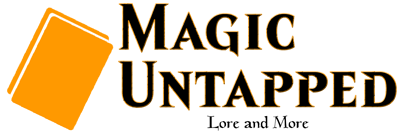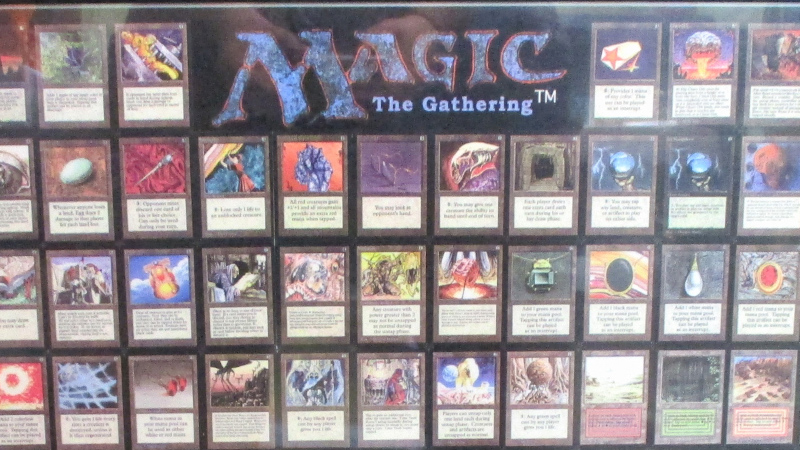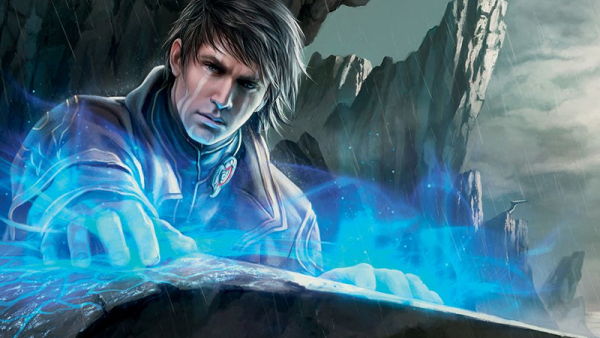Magic: The Gathering's first officially licensed product was a charity poster.
No one knew how big Magic: The Gathering was going to be when it debuted in August of 1993 during GenCon in Indianapolis. Card-based games were still seen as hit and miss at that point, and Magic was no exception. That is until, you know, it was.
After Alpha came out, the popularity of Magic exploded, something that continued further on after the release of Beta. And that was really what Wizards of the Coast had going for them with Magic. It was purely about the card game itself. As such, Wizards of the Coast didn't really have any immediate plans for merchandising the game.
So, with a sudden market for all things MTG, it was up to third party and local sellers to get in on it (think about how fan-made versions of Baby Yoda flooded Internet sites such as Etsy for months before Disney got in on the action). While some were admittedly pretty cool, like the first Magic tokens, none of it was officially licensed by WotC. That is, until a church got in on the action.
Seriously, out of every possibility out there, the first honest-to-god licensed Magic: The Gathering merchandise came by way of a charity drive. One by the name of "Charity Fellowship of the Truth" which assists and advocates to prevent abuse and discrimination against children, women, and families.
There is a name behind this, of course: Reverend David Moore. A minister from a to-this-date unknown religious order, Reverend Moore was popularly known as "Reverend Magic", serving the greater Rochester, New York-area of their spiritual needs. Or, maybe he did, but as people who knew him have said, The Charity Fellowship was a bit more of a way to sell Magic cards than as a charity or church. And, by a bit more, they were totally just a company that helped players finish off their sets by getting them the right cards. In Rochester, he was one of the top sellers of the new MTG card game, and sometime after the release of Beta, he saw the demand for more and decided to do something about it.
So the Charity Fellowship rung up WotC and asked for permission to print up 1,000 posters with every card from Alpha and Beta on it, as well as a few little odds and ends. In short, WotC said yes.
As this was back in the days before personal computers could really help with sort of thing, the Fellowship got a local collector to place all the cards in order on a flat service, with the Fellowship's contact info at the bottom to sell more cards and simply took a big photo of them all, making it look like a graphically designed piece. For a packaging and promotional illustration they didn't use the official Magic: The Gathering logo. Rather, the drew one up by themselves and surrounding it with a bunch of general fantasy lineart.

Say what you will, but damn if it didn't work. The posters, known as "The Magic Card Catalog," were a big hit. The religion-backed, Magic-card selling operation from New York State literally just took a big photo of borrowed cards created the first officially licensed MTG merchandise.
As well as it all went, the success was short-lived. Believe it or not, WotC thought that the organization had done too good of a job, as the photographic quality was so high that players could even make out card defects from the images on the poster. Concerned about the potential for counterfeit cards, WotC pulled their consent.
Of course, Magic soon had a full line-up of merchandise within a few years, so it's not like consumers were really missing out.
As for Rev. Moore, he continued to have an interesting life. He moved away from the Magic: The Gathering posters and, at one point, was a part of some diamond hijinks a decade later (seriously).
As for the posters existence in today's world, you can still sometimes find them on websites like eBay where they can sell for a grand or more.









